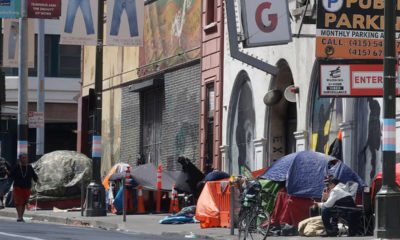Published
5 years agoon

Gov. Gavin Newsom devoted most of his State of the State address this month to California’s ever-growing crisis of homelessness, outlining a broad new approach and pledging that he will make it work.
“I don’t think homelessness can be solved,” he concluded, “I know homelessness can be solved. This is our cause. This is our calling.”

While Californians still want the homeless to be helped, two-thirds of poll respondents also want their encampments removed from public areas and high-risk fire zones.
Newsom and other politicians survive by sensing what voters want and what they will not tolerate and acting accordingly. We may be, therefore, seeing the beginnings of a tougher approach — not only clearing encampments from public sidewalks and other high-visibility sites, but perhaps compelling the homeless with mental ailments to undergo therapy.
Newsom talked of modifying state and federal policies that essentially did away with compulsory treatment of the mentally ill, calling not only for more comprehensive care but, if necessary, requiring it via “conservatorships” for those unable to care for themselves.
Clearing homeless encampments from public places has been virtually impossible, at least in Western states, because of a 2019 federal appellate court ruling — which the Supreme Court refused to review — that says local governments cannot prohibit the homeless from camping unless they provide alternative locations.
The 9th Circuit Court of Appeal ruling cites the 8th Amendment to the U.S. Constitution prohibiting “cruel and unusual punishment” and declares that anti-camping laws “punish a person for lacking the means to live out the universal and unavoidable consequences of being human.”

FILE – In this Oct. 8, 2019, file photo, California Gov. Gavin Newsom speaks during an interview in Sacramento, Calif. Newsom said on Wednesday, Jan. 8, 2020, that he is seeking $750 million to help pay rent for people facing homelessness, among other purposes, in the most populous state’s latest attempt to fight what he called a national crisis. (AP Photo/Rich Pedroncelli, File)
However, in a little-noticed footnote, the court declared, “Even where shelter is unavailable, an ordinance prohibiting sitting, lying, or sleeping outside at particular times or in particular locations might well be constitutionally permissible. So, too, might an ordinance barring the obstruction of public rights of way or the erection of certain structures,” if such a law is needed to “protect the public health, safety and welfare.”
Relying on that footnote, the city of Sacramento’s staff has proposed an ordinance to prohibit the homeless from camping within 25 feet of river levees, hospitals, bridges, fire and police stations, pump stations and other public facilities and it was scheduled for approval at Tuesday night’s city council meeting.
A staff report cites numerous fires and other hazards associated with homeless camps and declares, “The proposed ordinance is an exercise of the city’s authority to protect the public health, safety, and welfare as recognized by the 9th Circuit …”
Were it to survive the inevitable legal challenge, Sacramento’s ordinance would, in effect, respond to the findings of the USC poll about the public’s loss of patience that Newsom also underscored in his address.
CalMatters is a public interest journalism venture committed to explaining how California’s state Capitol works and why it matters. For more stories by Dan Walters, go to calmatters.org/commentary.


Newsom Sets New Tone for California, White House Partnership


Walters: Democrats Overreach on Recall, Miss Valid Point


California Mobilizes National Guard Amid Concern Over Unrest


How California’s Budget Depends on Staggering Wealth Gap


Proposed Corporate Tax Hike in California Would Aid Homeless


Democrats Liken Newsom Recall Effort — a Legal Option in California — to Extremist ‘Coup’




